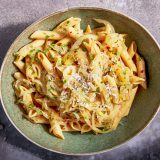In his tiny restaurant kitchen 30 minutes north of Rome, surrounded by the fantastically rustic fresh pasta he rolls and cuts by hand, Filippo Guarera uses the same word over and again to describe the cooking he and his wife do—sacred.
Probably fitting given the eatery’s name—Osteria del Cardinale. Or, The Cardinal’s Tavern. Of course, Guarera has no idea how the place got its name. He and Paola Saviotti have been its stewards for just the last 17 years of its long life. “Probably because some cardinal passed by,” he says with a shrug. The couple’s spirituality really is directed more at the food anyway.
The couple keep their restaurant casual—its hodgepodge of glassware is stacked randomly in a grandmother’s hutch and lunching firemen linger around mismatched tables—and their intentionally affordable menu is built largely from recipes even many Italians have forgotten, yet somehow simultaneously feel comfortable and familiar.
“It’s important to go in search of recipes that go back 100 years or more,” he says. “I regard these recipes as sacred to the land and feel people should not lose hold of them.”
Which is what brought me there. I’d heard rumors of a deliciously simple pasta dish from Puglia in southern Italy that Guarera had recreated. The name really said it all—fettuccine alla cipolla. Onion fettuccine.
The recipe name sums up much of the ingredient list. To it, Guarera adds copious wild oregano he grabs from outside, a generous hand of pecorino Romano cheese, a bit of salt and pepper, and not a lot else. “It’s a harmony, the oregano and sweet onions,” he says.
It truly was. A sweet and savory tangle of onions wound around those robustly tender-chewy noodles. But, as often is the case, trying to recreate it at home proved a challenge. Relying on such a simple array of ingredients, means they must be truly excellent to shine. And the options we often have in U.S. supermarkets just don’t deliver.
Luckily, the solutions were as simple as the original recipe itself. A bit of red pepper flakes and lemon zest helped compensate for the more flavorful and sweet onions Guarera used. And even the best dried pastas we tried couldn’t compete with his homemade fettuccine. We found whole-wheat pasta actually was a better substitute.
The result was subtle, yet richly flavored and sacrificed none of its wonderful simplicity. I might even describe it as sacred.
Finding Italy’s Forgotten Pastas
J.M. Hirsch

Get the Recipe
Whole-Wheat Pasta with Pecorino and White Wine-Onion Sauce
North of Rome, we are introduced to a pasta so simple, its name is practically the recipe
Photo: Joe Murphy; Styling: Wes Martin






